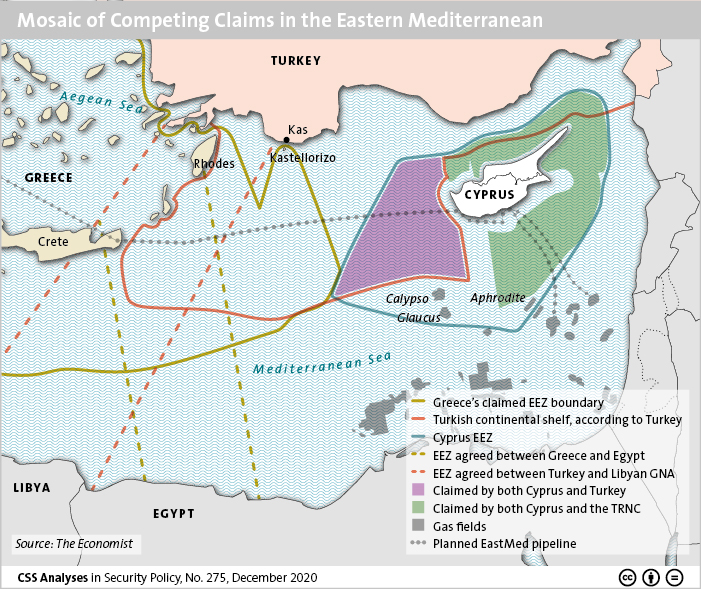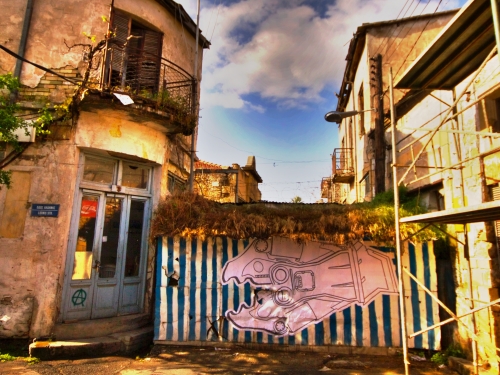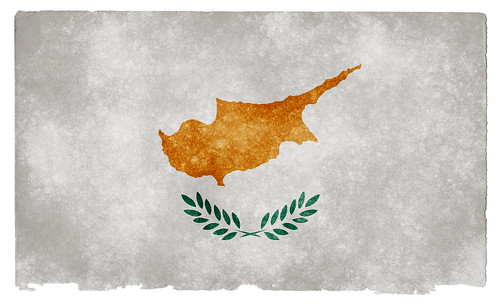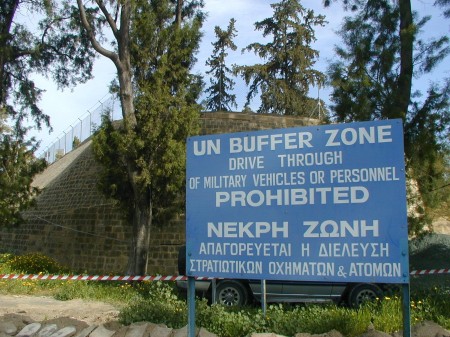
This week’s featured graphic maps the mosaic of competing claims in the Eastern Mediterranean as of December 2020. For more on Turkey and the Eastern Mediterranean, read Fabien Merz’s CSS Analyses in Security Policy here.

This week’s featured graphic maps the mosaic of competing claims in the Eastern Mediterranean as of December 2020. For more on Turkey and the Eastern Mediterranean, read Fabien Merz’s CSS Analyses in Security Policy here.

This article was originally published by the Elcano Royal Institute on 19 January 2017.
Summary
The reunification of Cyprus is one of the world’s longest running and intractable international problems. The latest talks in Geneva in January 2017 between Nicos Anastasiades, the Greek-Cypriot President, and Mustafa Akıncı, his Turkish-Cypriot counterpart, after 20 months of negotiations, made significant progress. The issues of territorial adjustments and security and guarantees are the most sensitive and core issues yet to be resolved and ones that will determine whether a solution can be reached and approved in referendums on both sides.
Analysis
Background
The Mediterranean island has been divided since Turkey’s invasion in 1974 in response to the Greek military junta’s backing of a coup against President Makarios aimed at enosis (union with Greece).1 Cyprus is the only divided country in Europe and its capital, Nicosia, is also split in two.

This article was originally published by Europe’s World on 11 Sepember, 2015.
There is no doubt that following the rise of Mustafa Akıncı to become the Turkish Cypriot leader this April, there have been high expectations for a resolution to the Cyprus problem. Nevertheless, it is important to be pragmatic and not underestimate the difficulties. For a real resolution, it is essential to achieve consensus on several major aspects of the problem.
First, there are serious constitutional disagreements between the two sides. The Greek Cypriot position is that the bi-zonal, bi-communal federation and the new partnership are an evolution of the Republic of Cyprus, which is recognised by all countries except Turkey. The Turkish Cypriot position is that the new partnership will involve a new state entity, to be created by two equal and sovereign constituent states. In terms of governance, the Greek Cypriots stress the importance of a unified state with a common society, economy and institutions. Turkish Cypriot positions revolve around entrenching a new situation based on ethno-communal lines. Bridging this gap will be difficult given that the positions reflect two fundamentally opposing philosophies. Furthermore, while the Turkish Cypriot positions are nearer to a confederation, or at best a very loose federation, the Greek Cypriots have in mind a federal arrangement with a rather strong government. It should be stressed that President Nicos Anastasiades himself may be willing to engage in a serious discussion about decentralisation provided he is satisfied on other issues such as territory and property.

Cyprus is currently envisaging remarkable development. Governments changed in both parts of the island amidst economic troubles that call for drastic reforms. A casual observer might find that a new opportunity arises from all the turmoil. For the first time in Cypriot History both governments are led by, at least former, supporters of a final solution to the Cyprus problem.
The new President of the Republic of Cyprus, Nicos Anastasiadis, was one of the few Greek Cypriot politicians, who supported the Annan-Plan, a comprehensive solution plan that failed to gain Greek Cypriot public support in the 2004 referendum. Özkan Yorgancioğlu, the new Turkish Cypriot Prime minister represents the Cumhuriyeti Türk Partisi, a party that equally supported the UN-blue print in the referendum that a majority support amongst Turkish Cypriots.

The division of Cyprus embodies most of the challenges that the Mediterranean region is facing today.
In 1974, following the Greek coup attempt, the Turks invaded the island and now occupy the northern part – called the Turkish Republic of Northern Cyprus – which is recognized only by Turkey.
Since that time, the frozen conflict over Cyprus has been a sticking point for both the EU and Turkey: the EU for having one of its member states occupied by a foreign country; and Turkey for having its EU accession hopes slowed down.
Cyprus represents a divided region, divided between a Muslim and a Christian community; between an aging side looking for comfort and a youthful one looking for opportunities; between a peaceful Europe with a high GDP and a conflicting Arab world that struggles to adapt to globalization.
It is also divided by a physical wall, the Green Line, which until 2003, was not possible to cross.